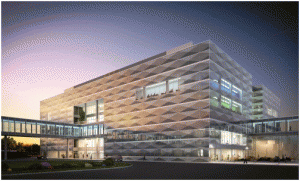
U of Waterloo breaks ground on innovative engineering building
Stephen Law
Electronics EngineeringEngineering 7 will have some of the best research facilities in the world
The University of Waterloo broke ground on an innovative engineering building that will feature facilities designed to expand student-driven innovation and advanced research labs to develop emerging technologies that will help to boost Canada’s global competitiveness.
The new $88-million building, Engineering 7, will provide students with enhanced learning experiences as well as researchers and graduate students with state-of-the-art facilities to advance their work on emerging and disruptive technologies including machine intelligence, automation of knowledge work and wearable biomedical devices to monitor human health.
“This University is always looking for creative new ways to address the challenges of the future. This innovative new building will have some of the best research facilities in the world to help us identify novel solutions that will keep Canada competitive in the global economy,” says Feridun Hamdullahpur, president and vice-chancellor of Waterloo. “Continuing to transform our campus with first-class facilities like this will allow us to attract top talent to Waterloo.”
Perkins+Will of Toronto designed the seven-story, 240,000-square-foot building – one of the largest on campus. Scheduled to open in September 2018, Engineering 7 is located beside the existing Engineering 5 and the two buildings will be joined by a central atrium and enclosed pedestrian bridges.
The new building will provide much-needed student study and community spaces for all Waterloo Engineering students, as well as classrooms, teaching labs and faculty offices to accommodate enrolment growth in the biomedical engineering and mechatronics engineering programs.
Part of the funding for Engineering 7 will come from the Educating the Engineer of the Future campaign, a $70-million fundraising effort that was launched earlier this year. The campaign supports priorities that include enhancing student experience, establishing research programs in emerging technologies, supporting graduate scholarships and ensuring Engineering 7 is constructed.
“Waterloo Engineering will graduate even more highly sought-after engineers while catalysing more innovations, inspiring more entrepreneurs”
“Our focus on educating the engineers of the future, and the the construction of Engineering 7, means that Waterloo Engineering will graduate even more highly sought-after engineers while catalysing more innovations, inspiring more entrepreneurs and supporting the next wave of high-impact research,” says Pearl Sullivan, dean of the Faculty of Engineering. “In the same way that our leading co-op program redefined the way we deliver education, our ability to educate the engineers of the future will to continue to set Waterloo far apart as we stay ahead of changes to the global economy.”
Two anonymous donors have already given gifts of $25 million and $10 million to the campaign. Recognizing Waterloo Engineering’s critical role in ensuring Canada is educating engineers who can tackle the truly difficult problems as technology shifts rapidly and grows in complexity, the Famille Jacques Lamarre Family, General Motors of Canada, Magna International and Toyota Motor Manufacturing Canada have also donated $1 million or more each toward the campaign.
Engineering 7 will also accommodate a flagship learning space, the Engineering Ideas Clinic, where undergraduate students will integrate classroom theory with multidisciplinary hands-on learning as they design, build, test and refine their ideas. A student-centric building, there is dedicated study and social spaces for students, lecture halls and entrepreneurial support areas, along with 20 design garages for student design teams to prototype their Capstone Design projects.
Engineering 7 will house some of the best research facilities in the world, including the Multiscale Additive Manufacturing (3D Printing) laboratory, and the RoboHub – the only robotics testing facility in Canada which can support testing of aerial, mobile and magnetically levitated robots.
EllisDon will construct the building that will become the permanent home for the Conrad Center for Business, Entrepreneurship and Technology, and the Engineering Outreach unit, which offers STEM education programs for elementary and high school children, such as Engineering Science Quest and Go ENG Girl.

